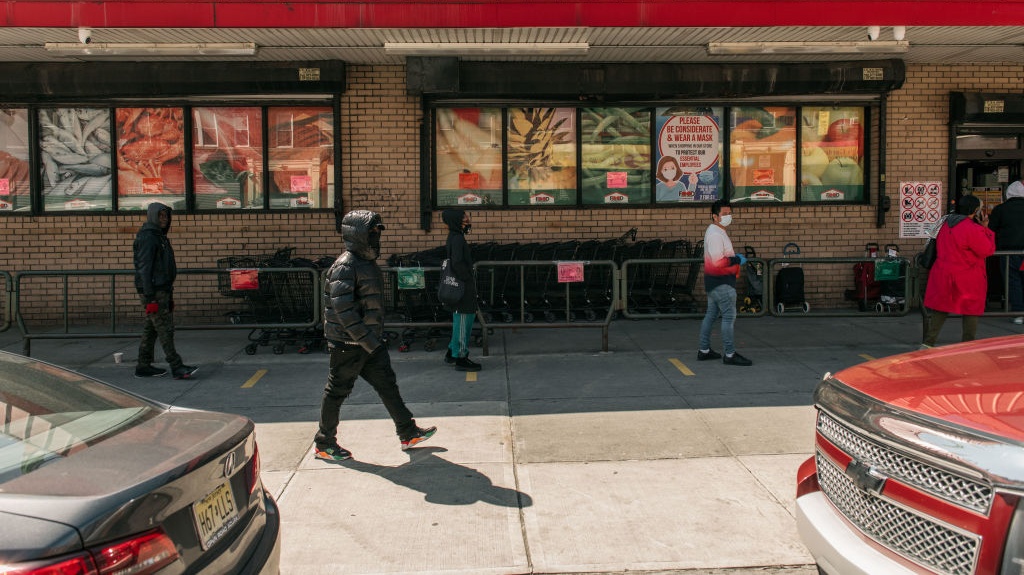If you’re interested in sharing your opinion on any cultural, political or personal topic, create an account here and check out our how-to post to learn more.
____
Every December, the American dictionary publisher Merriam-Webster announces its Word of the Year, based on top searches and increased cultural relevance over the previous 12 months. 2019’s word was “they,” selected for its growing usage as a non-binary gender pronoun and demonstrating our expanding notions of inclusivity and belonging. The year before, it was “justice,” as lookups for racial, economic and social justice rose nationwide, legal obstruction and corruption seeped from the Oval Office, and the dignity of our Supreme Court was further eroded with the confirmation of Brett Kavanaugh.
Our current reality being what it is, I have a guess about what Merriam-Webster will pick for 2020’s top term: social distancing.
As the COVID-19 pandemic rages on, Americans have retreated from shared spaces, spreading out and sheltering to protect themselves and their families. We are staying away from one another at the recommendation of medical and public health experts and the emergency mandate of some of our public officials — those more concerned with the health and safety of their citizens than with political poll numbers and their own approval ratings, at least. The new normal is keeping us apart from our neighbors, our extended families and loved ones, our co-workers, our congregations and our communities.
In many ways and for so many of us, however, this doesn’t feel particularly new. Our society has actually been built upon and defined by social distancing for many years. It’s called systemic and institutional racism. Our own cultural and political apartheid is as American as apple pie, from redlining to gated communities; white flight to gentrification; poll taxes to voter purges; segregation in schools to insurmountable college debt; expanding mass incarceration to contracting mass transit. We have been kept apart from one another for decades, if not centuries.
There’s an old adage that seems particularly fitting now: when white folks catch a cold, Black folks get pneumonia. This fundamental reality — the exacerbation of existing inequities during times of crisis — is seen in even sharper focus during a global pandemic.
For the backbone of our working class — immigrants, and Black and brown folks — COVID-19 is hitting harder and longer and unveiling long-held historical injustices and structural inequities that remain heartbreakingly present in our flawed democracy. This moment calls for a greater understanding of who truly is afforded dignity in our society. Who — in our collective, public imagination — we deem human, worthy of care and consideration. Our uneven distribution of resources, security and opportunity, which favors privileged white folks and leaves communities of color to fend for themselves, is growing more and more evident with each passing day as coronavirus ravages frontline communities that can’t telecommute to work or school; that don’t have job security, disposable income, or paid sick leave; that can’t put rent, groceries or their electric bills on a credit card.
Those working harder now — all those essential service laborers who already struggle to earn a living wage under the most normal of circumstances — are more at risk of infection, yet have less access to health care, should they need it. And the latest government plans leave millions of people unprotected, as communities seek care and resources to survive, while serving the needs of corporations.
This ugly reality falls upon our country at a time when white, male presidential candidates have been attempting to “win the Black vote,” a showcase of how Black and brown voters are commodified and minimized to their participation in two election days when needed for white gain. These are the same communities simultaneously denied the fundamental resources for safety and security — employment, education, healthcare, housing — that are especially crucial in this moment. Our public health crisis is mirrored by our stagnant crisis of democracy, a quagmire of corruption, racism and eroding rights.
But despite all this, we’ve seen how historically marginalized and criminalized communities in our society resist and persist through crisis. Black and brown communities have survived through the double shock and awe of natural disasters brought on by climate change and the predatory disaster capitalism that followed in their wake. We have weathered the violence and upheaval wrought by colonialism and imperialism. We have risen from the ashes of economic collapses caused by the unchecked neoliberalism and unregulated greed of our new Gilded Age.
The COVID-19 crisis is an opportunity for us, as Americans, to shift our very thinking of who is most infected, afflicted, affected and why. We must see people having the right not only to be but also to define what our common humanity should look like — economically, spiritually, positionally and democratically. It’s time to come together while we shelter in place. We can keep our hands clean, without washing them of the responsibility to support each other through the expansion of our imagination and move beyond aspiration to realities that transform the lived experiences of those who are suffering.
This is why organizations like Demos and our partners are fighting to protect access to the ballot for Black and brown voters; advancing race-forward policies and analyses that address the economic response; and building long-term state power with Black and brown movement leaders.
According to Merriam-Webster, the term *social distancing was first used in 2003 — the same year their inaugural Word of the Year list was unveiled. The top three terms? Democracy, quagmire and quarantine.
This is a crisis none of us have ever seen before. It’s changing our work, our lives, our humanity. It’s changing our dictionaries. And it’s time for a new definition of what democracy means — one built on justice and inclusivity, so that when our national quarantine ends, we emerge stronger, fairer and together.
____
Rodney McKenzie, Jr. is Executive Vice President of Movement Strategies at Demos.
